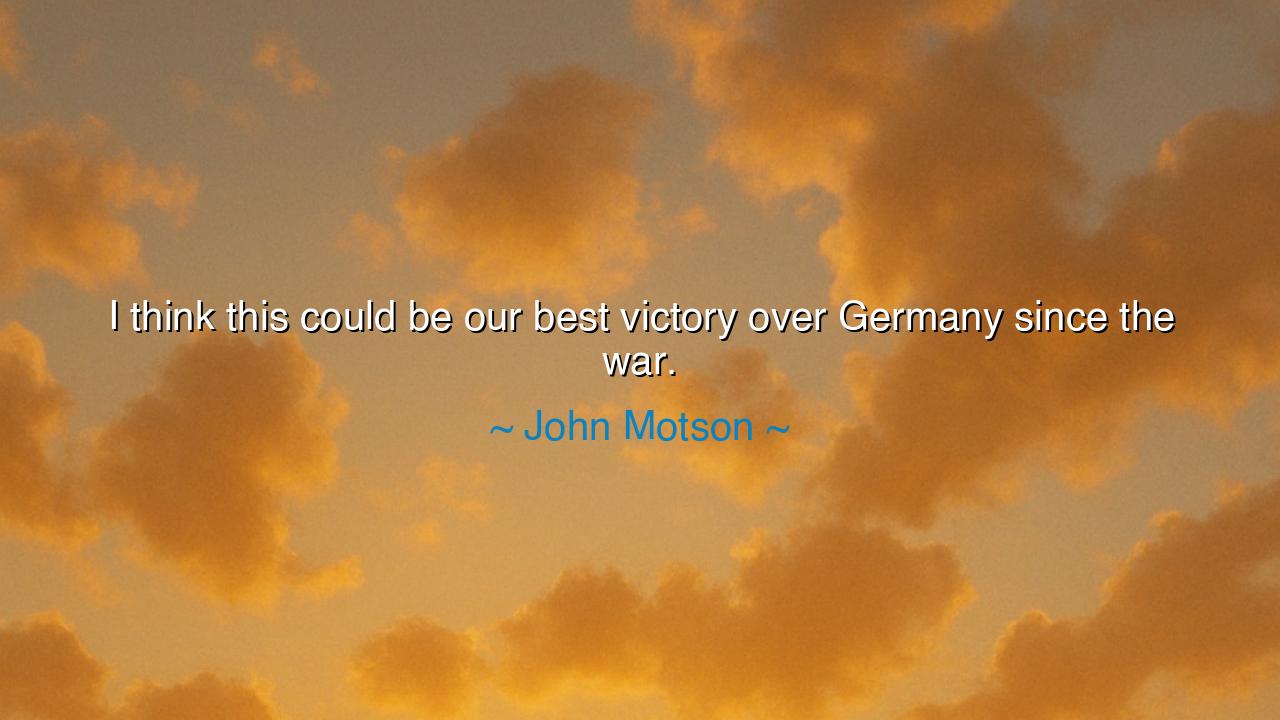
I think this could be our best victory over Germany since the






Hear, O listeners, the voice of John Motson, the great English commentator, who once declared: “I think this could be our best victory over Germany since the war.” Though the words are born of sport, they carry the echoes of history, for on the football field the memory of conflict still lingered. In the clash of nations through sport, the past rose like a ghost, and each goal scored was felt as more than a point—it was the shadow of triumph and loss, victory and remembrance.
For to speak of a victory over Germany in England is never neutral. The scars of the Second World War were deep, etched into the souls of fathers and mothers, carried in stories of bombed cities, of rationing, of sacrifice. When the two nations met on the football pitch, it was not merely sport—it was memory made flesh. The green field became a stage where history replayed itself, where the bitterness of conflict could be transformed into the glory of competition. Thus, Motson’s words carried more than commentary: they carried the weight of a nation’s heart.
Consider the legendary match of 1966, when England defeated West Germany in the World Cup final at Wembley. That victory, still sung of in English lore, was celebrated as if it were more than a sporting triumph—it was a symbolic reclaiming of pride and resilience after years of hardship. Every pass, every strike, every goal was imbued with echoes of struggle and survival. Motson, speaking years later, touched that same nerve: that in sport, as in war, there are moments when the spirit of a people feels itself vindicated.
Yet Motson’s words also remind us of the strange power of memory. Wars end, treaties are signed, enemies become allies, and yet, in the hearts of the people, memory lives on. Sport, in its passion, becomes the vessel in which those memories resurface. But unlike war, it does not destroy; it heals, it transforms rivalry into play, conflict into spectacle. What once required blood and sacrifice can now be carried out in cheers and chants. The sword is exchanged for the ball, and nations can meet not in hatred but in contest.
But we must be wise. To remember the war through sport is natural, yet to bind ourselves forever to its divisions is dangerous. For Germany, too, bore scars, and in the decades after the war, it labored to rebuild, to reconcile, to forge bonds of peace with former enemies. To continue to see every game as a reenactment of war is to chain ourselves to the past. The true greatness of sport is not that it recalls the conflict, but that it gives us a way to move beyond it—where rivals can embrace when the match is done, where the field ends in fellowship, not enmity.
So let us hear Motson’s words with understanding: yes, the victories on the pitch against Germany stirred old memories, filled the hearts of England with pride, and gave the people a sense of triumph. But beyond that, let us see the deeper truth: sport gives us a stage to play out the rivalries of the past without violence, to transform the weight of history into the joy of contest.
Therefore, O children of tomorrow, take this lesson: let your struggles be fought in the spirit of play, not destruction. Remember the past, but do not be enslaved to it. Celebrate victories, but let them bind you closer, not drive you apart. For true victory is not only to win a match, but to turn old enemies into companions, and to show that the strength once spent in war can now be spent in peace. For the greatest victory over Germany, or any rival, is not found in war—it is found in friendship forged after the contest is done.






NTngoc thuong
There’s something very human about this quote—it mixes humor, pride, and nostalgia. Motson wasn’t declaring war; he was celebrating a moment of unity through sport. Yet, the phrasing also shows how language preserves old hierarchies of victory and loss. I’d like to ask whether our metaphors have evolved since then, or if we still instinctively frame competition as a kind of civilized warfare that keeps national myths alive.
TGduong the gioi
Motson’s remark reflects the powerful emotional connection between history and sport. It suggests that national memory doesn’t fade—it simply finds new arenas to express itself. I’m curious how younger audiences, detached from wartime experience, interpret such statements. Do they feel the same resonance, or does the comparison sound outdated? It’s a reminder that sports commentary often carries more cultural baggage than it intends to.
NNNguyen Nam
This quote captures how easily sports become metaphors for geopolitical struggle. Beating Germany 'since the war' invokes not just football, but redemption, pride, and national identity. Yet it also highlights how storytelling amplifies emotion—turning a game into a moral victory. I’d love to discuss whether such rhetoric reflects genuine rivalry or the media’s need to dramatize every sporting encounter as a symbolic battle.
LET H E C I R C L E
I find this quote amusing but also culturally revealing. It shows how sports commentary taps into collective memory—especially in countries whose identities were shaped by world wars. Still, it raises a question about sensitivity. When does patriotic enthusiasm cross the line into historical insensitivity? Maybe Motson’s excitement was harmless fan passion, but it reminds us that history always lingers beneath the language of competition.
CLCuong Le
This statement makes me reflect on how sports often serve as a form of collective catharsis. For older generations, beating Germany on the football pitch might carry echoes of historical rivalry, even if unconsciously. But should modern competition still carry the shadow of past wars? I wonder whether using wartime language in sport perpetuates outdated national rivalries or simply acknowledges the emotional depth of shared history.